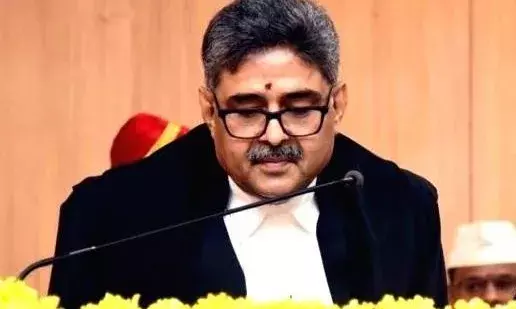Justice Rakesh Kumar: A Lone Crusader for Judicial Integrity
His Bold Stand Against Corruption Sparks Conversations on Transparency and Accountability in the Judiciary;

As the debate rages over the reported recovery of a “huge pile” of cash from the residence of a Delhi High Court judge, people in Bihar recall a strikingly similar moment in judicial history. On August 28, 2019, Justice Rakesh Kumar, then the most senior judge of the Patna High Court, passed an unprecedented order directing the CBI to investigate corruption in the state judiciary. However, his move was swiftly countered by an 11-judge bench, which suspended his order.
A Bold Allegation Against Judiciary
Justice Kumar made headlines while delivering a verdict on an anticipatory bail plea. In a rare show of defiance, he alleged widespread corruption and nepotism within the judiciary. However, his outcry was met with sharp resistance. The 11-judge bench, in its ruling, stated that such remarks amounted to contempt, undermining public faith in the judicial system.
Refusing to Stay Silent
During the hearing, Justice Kumar expressed his determination not to remain a “mute spectator.” His intention was clear—he wanted to escalate the matter to the Supreme Court, the Prime Minister’s Office, and the Ministry of Law. He even directed that copies of his order be sent via registered post.
Backlash from Fellow Judges
The Patna High Court judges were quick to strike down Justice Kumar’s order. Their ruling noted that he had studied the case file days before passing the directive, indicating premeditated action. They also took issue with his “scathing remarks” about fellow judges, particularly those who had graduated alongside him in 1986.
The Judiciary vs. Justice Kumar
The bench’s response was severe. It accused Justice Kumar of violating the principles of natural justice, stating that he saw himself as the “sole custodian” of judicial truth. In their view, his concerns were “completely inappropriate” and akin to “gossip.”
The Fallout: Isolation and Transfer
Justice Kumar’s call for a CBI probe made him an outcast among his peers. His brother judges reportedly began treating him as untouchable, even boycotting him at the traditional Friday lunch. His judicial powers were revoked, and soon after, he was transferred to the Andhra Pradesh High Court in Amravati.
A Career Marked by Integrity
Justice Rakesh Kumar, now 60, began his career at the Patna High Court, where he was appointed as an additional judge on December 25, 2009. He took oath as a permanent judge on October 24, 2011. His bold stance against corruption, though met with resistance, remains a testament to his unwavering commitment to judicial integrity.
A Story That Deserves Attention
Justice Kumar’s case raises critical questions about judicial accountability and the price of speaking out against corruption. As new controversies unfold in the judiciary, his story serves as a reminder of the risks faced by those who dare to challenge the system.

